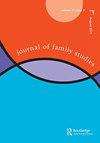配偶对家务劳动分工和婚姻满意度评估的二元研究
IF 1.6
4区 社会学
Q3 FAMILY STUDIES
引用次数: 0
摘要
摘要在本研究中,我们检验了配偶对家务分工的评估与婚姻满意度之间的关系模型。该模型在一项双元研究中得到了验证,该研究使用了生活在以色列且至少有一个孩子的异性恋夫妇(n = 479)作为样本。配偶们从四个方面评估了家务劳动的分工:传统的女性家务、传统的男性家务、儿童保育和情感工作。报告说,做较少传统女性家务和较少情感工作的丈夫对婚姻更满意。那些少做传统男性家务、少照顾孩子和情感工作的妻子对婚姻更满意。与此同时,那些做较少男性家务和较少情感工作的丈夫,其妻子的婚姻满意度往往更高。据报告,做家务少、情感工作少的妻子,其丈夫的婚姻满意度往往更高。丈夫和妻子报告的婚姻满意度水平相似,他们的婚姻满意度水平呈强正相关。研究结果表明,家庭劳动分工对婚姻满意度的影响存在两种机制:利己机制和感恩机制。本文章由计算机程序翻译,如有差异,请以英文原文为准。
A dyadic study of the spouses’ assessment of the division of domestic labour and marital satisfaction
ABSTRACT In this study, we tested a model connecting the spouses’ assessment of the division of domestic labour and their marital satisfaction. The suggested model was tested in a dyadic study using a sample of heterosexual couples living in Israel and having at least one child (n = 479). The spouses assessed the division of domestic labour in four domains: traditionally feminine chores, traditionally masculine chores, childcare, and emotion work. Husbands who reported doing fewer traditionally feminine chores and less emotion work were more satisfied with their marriage. Wives who reported doing fewer traditionally masculine chores and less childcare and emotion work were more satisfied with their marriage. Simultaneously, husbands who reported doing fewer masculine chores and less emotion work tended to have wives with higher levels of marital satisfaction. Wives who reported doing fewer feminine chores and less emotion work tended to have husbands with higher levels of marital satisfaction. Husbands and wives reported similar levels of marital satisfaction, and their levels of marital satisfaction were strongly positively correlated. The obtained results indicated the existence of two mechanisms connecting the division of domestic labour to marital satisfaction: an egoistic mechanism and the gratitude mechanism.
求助全文
通过发布文献求助,成功后即可免费获取论文全文。
去求助
来源期刊

Journal of Family Studies
FAMILY STUDIES-
CiteScore
3.20
自引率
12.50%
发文量
52
期刊介绍:
The Journal of Family Studies is a peer reviewed international journal under the Editorship of Adjunct Professor Lawrie Moloney, School of Public Health, LaTrobe University; Australian Institute of Family Studies; and co-director of Children in Focus. The focus of the Journal of Family Studies is on the wellbeing of children in families in the process of change.
 求助内容:
求助内容: 应助结果提醒方式:
应助结果提醒方式:


